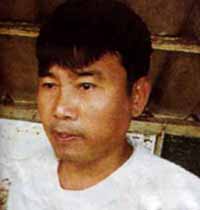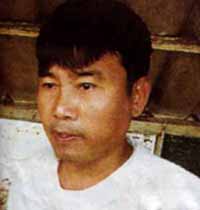After serving 27 years in prison, Laphai Zau Seng, the assassin who killed a top Burmese military commander in 1985, walked free from prison on Tuesday after being released as one of the 89 political prisoners receiving amnesty from Burma’s president.
Immediately after his release, Zau Seng traveled from Mandalay to Rangoon, hoping to meet up with some of his former cellmates.
Speaking to The Irrawaddy on Wednesday, he said he had mixed feeling about his release: on one hand he was grateful for the chance to see his mother and his friends; on the other, he said he found it overwhelmingly emotional.
Zau Seng is 49 years old now. He was just 22 when he was arrested for murder. His victim was a fellow Kachin—Brig-Gen L-Kun Hpang, the Burmese army’s northern commander, and the father of well-known singer L-Khun Yi.
While languishing in a Mandalay prison, Zau Seng told what happened on that evening to a fellow cellmate, a young political activist who later became a reporter at The Irrawaddy. In September 2010, The Irrawaddy published his story.

He candidly told how, on the evening of Oct. 16, 1985, he and three accomplices dressed as vendors and waited patiently on Ledo Road in Myitkyina for the chief of Northern Command to pass by on his way home from a nearby golf course. When L-Kun Hpang’s black Audi turned a corner, they each pulled AK-47s from their bamboo baskets and sprayed the vehicle with bullets.
“We did it out of a sense of belief, and because it was our duty,” he said on Wednesday.
But although Zau Seng admits his guilt, and says that the Kachin Independence Army (KIA) recruited him in his youth and trained him for the purpose of carrying out the deadly mission, the KIA leadership has consistently denied any involvement in the attack.
Zau Seng was originally sentenced to death by hanging, but after the 1988 uprising his sentence was reduced to 34 years, with an additional three years tacked on later.
On Monday, the President’s Office in Naypyidaw announced an amnesty for 514 prisoners ahead of a scheduled visit to the US by President Thein Sein. Among that number, 89 are considered dissidents or activists, including Zau Seng who said he was surprised to hear he was on the list.
He said he was told to sign a paper as a pledge to work for peace and for the development of the country. “If I do something wrong, I have to serve the remainder of my sentence,” he said.
With that, the steel door to the prison in Myingyan Township in Mandalay Region was opened and he was free to leave. He headed straight for Rangoon by bus , he said, because he wanted to speak with former cellmates including 88 Generation Students group members, before he returned to his home town of Myitkyina.
“The political situation is so different from the past,” he said, talking to The Irrawaddy by mobile phone from an office in the former Burmese capital. “That’s why I came down to Rangoon— to meet my friends from prison, and to discuss how I can help the Kachin refugees and how to build a lasting and genuine peace in the country.”
Zau Seng then said he did not want to talk any more about what happened in 1985. He said, “The past is the past, and it can’t be changed.” He said he would soon travel back to Kachin State to see his mother and his friends.

















